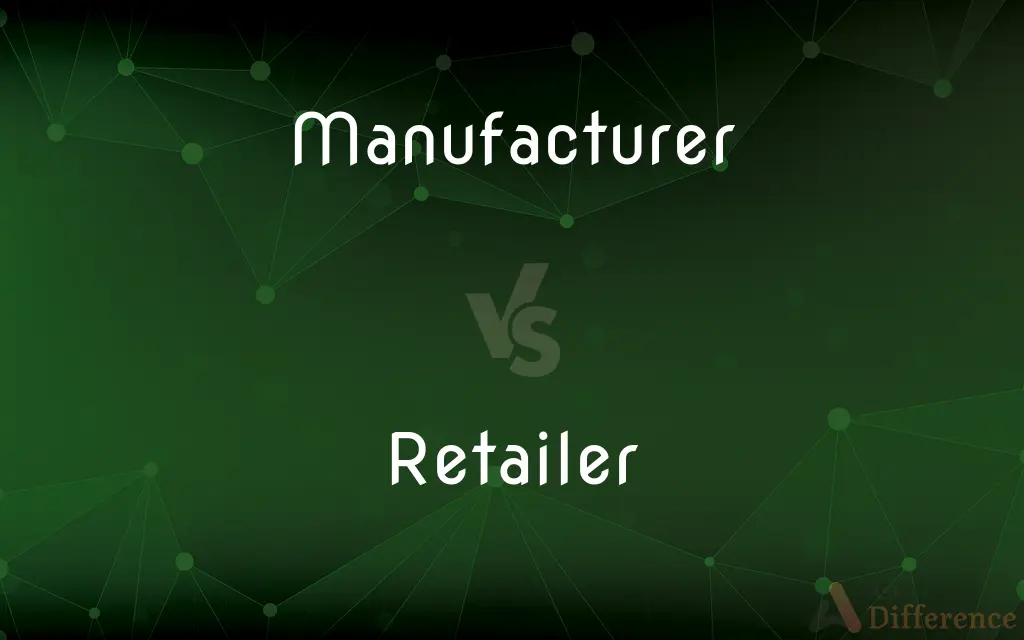Manufacturer vs. Retailer — What's the Difference?
By Tayyaba Rehman & Fiza Rafique — Published on September 18, 2023
A manufacturer produces goods from raw materials, while a retailer sells those goods directly to consumers.

Difference Between Manufacturer and Retailer
Table of Contents
ADVERTISEMENT
Key Differences
A manufacturer is an entity that takes raw materials and converts them into finished goods, ready for sale or distribution. A retailer, on the other hand, is the final stop in the distribution chain, selling goods directly to the end consumer. Manufacturers often operate large facilities, such as factories, and may or may not sell directly to consumers. Retailers are generally focused on customer interaction and are typically found in easily accessible locations like shopping malls.
The manufacturer's primary concern is producing a high-quality product efficiently and in large volumes. Retailers are more concerned with selling these products and managing inventory levels to meet consumer demand. While a manufacturer's success is largely determined by the efficiency of production processes, a retailer's success often hinges on customer satisfaction and the effectiveness of sales strategies.
In terms of scale, manufacturers usually operate on a much larger basis, often requiring extensive supply chain management. Retailers usually operate on a smaller scale and are more focused on localized markets, unless they are part of a larger chain. Manufacturers often deal with business-to-business (B2B) transactions, whereas retailers deal with business-to-consumer (B2C) transactions.
In summary, a manufacturer creates products from raw materials in large volumes, often distributing these products through a variety of channels. Retailers take these products and sell them directly to consumers, focusing on sales tactics and customer experience.
Comparison Chart
Primary Role
Produces goods from raw materials
Sells goods to consumers
ADVERTISEMENT
Customer Focus
B2B generally
B2C generally
Scale
Larger, industrial
Smaller, localized
Location
Factories, remote areas
Shopping malls, accessible locations
Key Concerns
Production efficiency, volume
Inventory management, customer satisfaction
Compare with Definitions
Manufacturer
Large Scale: "Manufacturers typically operate on a larger scale than retailers."
The manufacturer produces thousands of units each day.
Retailer
Consumer Focus: "A retailer sells goods directly to the consumer."
The retailer stocked new clothing items for the summer season.
Manufacturer
Supply Chain Participant: "A manufacturer is part of the supply chain, often closer to the raw material source."
The electronics manufacturer gets raw materials from various suppliers.
Retailer
Smaller Scale: "Retailers often operate on a smaller scale than manufacturers."
The retailer had a few local stores in the city.
Manufacturer
Goods Producer: "A manufacturer produces goods from raw materials."
The car manufacturer utilizes an assembly line to produce vehicles.
Retailer
Sales-Centric: "Retailers focus on selling products and customer satisfaction."
The retailer offered a money-back guarantee to satisfy customers.
Manufacturer
Production-Centric: "The manufacturer's key concern is efficient production."
The manufacturer invested in new machinery to improve production efficiency.
Retailer
B2C Business: "Retailers mainly engage in business-to-consumer transactions."
The online retailer offers fast shipping for customer convenience.
Manufacturer
B2B Focus: "Manufacturers often engage in business-to-business transactions."
The manufacturer sells engine parts to various auto shops.
Retailer
Final Stop: "A retailer is often the final stop in the distribution chain."
The retailer receives goods from various manufacturers.
Manufacturer
A person, an enterprise, or an entity that manufactures something.
Retailer
The sale of goods or commodities in small quantities directly to consumers.
Manufacturer
A person or company that manufactures.
Retailer
Of, relating to, or engaged in the sale of goods or commodities at retail.
Manufacturer
One who manufactures.
Retailer
In retail quantities.
Manufacturer
A business engaged in manufacturing some product
Retailer
At a retail price.
Manufacturer
Someone who manufactures something
Retailer
To sell in small quantities directly to consumers.
Retailer
(also rĭ-tāl) To tell or repeat (gossip or stories, for example) to others.
Retailer
To sell at retail.
Retailer
A retail sales company or salesman.
Retailer
One who retails anything; as, a retailer of merchandise; a retailer of gossip; - used also of businesses, including large corporations; as, Sears, Roebuck is one the the country's largest retailers.
Retailer
A merchant who sells goods at retail
Common Curiosities
Do Manufacturers Sell to Consumers?
Manufacturers may or may not sell directly to consumers; their focus is often on B2B transactions.
Do Retailers Produce Goods?
Retailers do not produce goods; they buy them from manufacturers or wholesalers to sell to consumers.
What is a Retailer?
A retailer sells goods directly to end consumers.
What is the Scale of a Manufacturer?
Manufacturers often operate on a large scale, producing goods in large volumes.
What is the Scale of a Retailer?
Retailers usually operate on a smaller, more localized scale.
What are the Key Concerns for Manufacturers?
Manufacturers are concerned with production efficiency and volume.
Where are Retailers Located?
Retailers are usually found in accessible locations like shopping malls.
What is a Manufacturer?
A manufacturer is an entity that produces goods from raw materials.
Do Retailers Have Their Own Brands?
Some retailers may have their own private-label brands, produced by manufacturers.
Can a Company Be Both a Manufacturer and a Retailer?
Yes, some companies act as both manufacturers and retailers, known as vertically integrated businesses.
What are the Key Concerns for Retailers?
Retailers are concerned with inventory management and customer satisfaction.
Where are Manufacturers Located?
Manufacturers are often located in industrial areas or factories.
Are Manufacturers Involved in Customer Service?
Manufacturers are generally not as focused on customer service as retailers are.
How Do Retailers Get Their Products?
Retailers get their products from manufacturers or wholesalers.
How Do Manufacturers Distribute Products?
Manufacturers may use various distribution channels, including wholesalers and retailers.
Share Your Discovery

Previous Comparison
Horizontal vs. Vertical
Next Comparison
Credit Card vs. Debit CardAuthor Spotlight
Written by
Tayyaba RehmanTayyaba Rehman is a distinguished writer, currently serving as a primary contributor to askdifference.com. As a researcher in semantics and etymology, Tayyaba's passion for the complexity of languages and their distinctions has found a perfect home on the platform. Tayyaba delves into the intricacies of language, distinguishing between commonly confused words and phrases, thereby providing clarity for readers worldwide.
Co-written by
Fiza RafiqueFiza Rafique is a skilled content writer at AskDifference.com, where she meticulously refines and enhances written pieces. Drawing from her vast editorial expertise, Fiza ensures clarity, accuracy, and precision in every article. Passionate about language, she continually seeks to elevate the quality of content for readers worldwide.











































